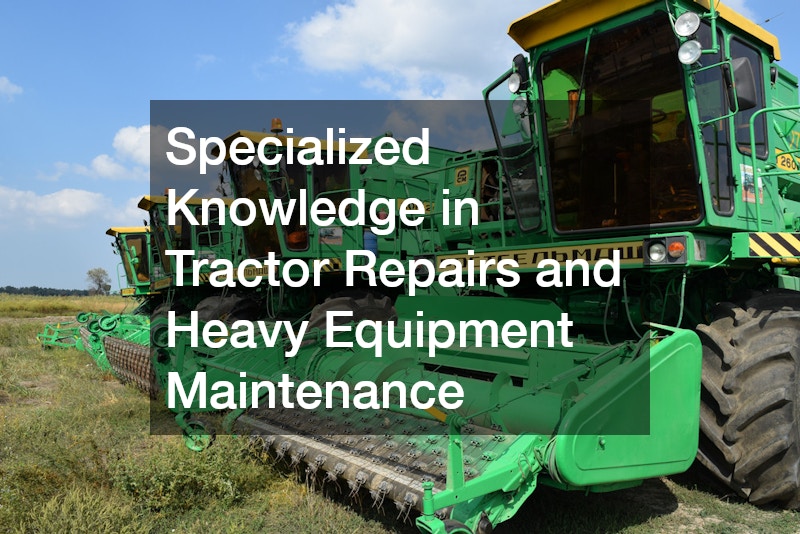The trades industry is a vital aspect of our economy, encompassing a broad range of professions that require specialized workforce skills. From auto repairs to air conditioning maintenance, these professions not only provide crucial services but also evolve as technology advances. As we navigate the challenges of a changing industry, understanding the necessary skills can help tradespeople remain competitive and effective in their roles.
Practical Skills That Power Trades: From Auto Repairs to Air Conditioning Maintenance

Every trade relies on a set of practical skills that are essential to executing tasks efficiently. In the realm of auto repairs, mechanics must be adept at diagnosing issues, wielding tools effectively, and performing complex repairs. Similarly, air conditioning maintenance requires not only technical know-how but also an understanding of the latest technologies and systems to ensure optimal performance.
Moreover, both fields necessitate a meticulous attention to detail. This precision is crucial when troubleshooting car problems or ensuring that an air conditioning unit operates reliably. Workforce skills in these trades not only enhance an individual’s capability but also contribute to overall customer satisfaction, which is key to building a loyal client base.
Furthermore, ongoing education and training are paramount for professionals in these sectors. With automotive technology advancing rapidly and HVAC systems becoming increasingly complex, staying informed about new developments is essential. By honing practical skills continuously, tradespeople can solidify their reputation and expertise within the industry.
Adaptability in Field Construction Unions: Staying Relevant in a Changing Industry

Field construction unions are increasingly focusing on the importance of adaptability among their members. As the construction landscape evolves with new techniques and materials, tradespeople must be equipped with workforce skills that allow for seamless integration of these changes. Emphasizing training programs and workshops can foster a culture of innovation within construction unions.
Adaptability also extends to embracing technology, such as utilizing building information modeling (BIM) systems. By learning to navigate these new tools, construction workers can collaborate more effectively, reduce waste, and streamline project timelines. Thus, adaptability not only enhances individual performance but also contributes to the overall success of construction projects.
In addition, maintaining strong communication skills is vital for adaptability. As projects evolve, construction teams must convey changes efficiently to avoid misunderstandings that could lead to delays. By fostering a workforce that values adaptability, field construction unions can ensure long-term success for both workers and contracts.
Specialized Knowledge in Tractor Repairs and Heavy Equipment Maintenance

The landscape of tractor repairs and heavy equipment maintenance requires specialized knowledge that reflects the growing complexity of machines in these industries. Workforce skills in these fields range from mechanical understanding to advanced diagnostics that utilize electronic systems. Specialists need to stay ahead of trends, such as energy-efficient machines that require different maintenance techniques.
Moreover, hands-on experience plays a critical role in mastering the necessary skills. Technicians must be comfortable not just with traditional mechanical repairs but also with the nuances of hydraulic systems and electronic components. This blend of skills allows them to diagnose and repair issues more effectively, thereby minimizing downtime for equipment owners.
Finally, continued education and certifications in heavy equipment technology are essential for career advancement. As machinery becomes more advanced, technicians need to pursue ongoing training opportunities to retain their edge in a competitive job market. Prioritizing these workforce skills can lead to job security and professional growth in the trades.
The Value of Precision: Workforce Skills for Window Tinting and Custom Services
In the realm of local window tinting services, precision is an indispensable workforce skill. Installers must measure accurately and apply film without bubbles or creases to achieve a flawless finish. This attention to detail not only impacts the aesthetic outcome but also affects the performance of the tint in terms of heat reduction and UV protection.
Additionally, custom services often require professionals to adapt their skills to meet unique client needs. Whether it’s a specific tint shade or a custom cut for an unusual window shape, versatility and creativity are pivotal. By mastering precise techniques, window tinting specialists can differentiate themselves from competitors, attracting a wider customer base.
Lastly, understanding the properties of different films and their applications can enhance an installer’s expertise in the field. The ability to recommend solutions based on client preferences strengthens customer trust and loyalty. Thus, mastering precision as a workforce skill in window tinting can lead to both personal success and satisfied clients.
Troubleshooting Techniques Every Roof Repair Professional Should Master

Troubleshooting is a critical component of roof repair services, requiring professionals to identify and rectify problems quickly. Mastering this skill involves understanding various roofing systems and the common issues that arise, such as leaks, wear, and structural problems. With experience and knowledge, roof repair specialists can not only fix immediate issues but also anticipate future problems, enhancing customer satisfaction and trust.
Moreover, effective troubleshooting often requires a systematic approach. Professionals must assess the situation, analyze potential causes, and develop a plan for action. This logical process is key to resolving issues efficiently and minimizing additional costs for clients.
Lastly, communication is vital when it comes to troubleshooting. Roof repair professionals must convey their findings and recommendations clearly to clients, ensuring that they understand the necessary work. By fostering transparent communication, tradespeople can build stronger relationships with their customers while demonstrating their expertise and reliability.
Customer Service as a Core Skill in Towing Services and Moving Companies
In the towing services and moving company sectors, customer service ranks as a foundational workforce skill that can make or break a business. The nature of these industries often puts clients in stressful situations, requiring professionals to provide empathetic and effective support. Strong communication skills and problem-solving abilities are essential for managing customer expectations while ensuring safety and satisfaction.
Additionally, understanding the nuances of each service helps enhance customer engagement. Tow truck operators must know how to handle various vehicle types under different conditions, while movers should be adept at packing and transporting belongings securely. By offering tailored solutions and actively listening to clients, businesses can create positive experiences that lead to repeat customers.
Finally, focusing on customer feedback is a key aspect of improving service quality. Collecting and analyzing client reviews can provide valuable insights into areas needing improvement, allowing companies to streamline their processes. By prioritizing customer service as a workforce skill, towing services, and moving companies can cultivate a loyal clientele and drive long-term success.
Teamwork on the Job: Insights from Concrete Contractors and Construction Crews
Effective teamwork is a cornerstone of success among concrete contractors and construction crews, where collaboration enhances workflow and project outcomes. Each team member plays a critical role, from project managers to laborers, requiring strong interpersonal skills and respect for one another’s contributions. By fostering a supportive team environment, projects are likely to be completed on time and within budget.
Furthermore, effective communication is vital for maintaining a cohesive team dynamic. Regular briefings and team discussions ensure everyone is aligned on project goals, timelines, and individual roles. This clarity helps eliminate misunderstandings that could lead to costly delays or errors.
Additionally, embracing diversity in workforce skills adds value to most construction teams. Members with different backgrounds and expertise can offer unique perspectives and problem-solving techniques, enriching the overall performance of the crew. By valuing teamwork, concrete contractors can capitalize on these varied skills to produce superior results.
Sustainable Practices in Septic Inspection and Waste Management Services
In the fields of septic inspection and waste management services, incorporating sustainable practices is becoming increasingly important. Workforce skills that prioritize environmental consciousness not only meet regulatory requirements but also contribute to public health and safety. Understanding the intricacies of waste treatment processes enables professionals to implement solutions that minimize environmental impact.
Moreover, ongoing education about sustainable technologies is essential for those in the industry. By investing in training related to innovative waste management techniques and eco-friendly products, professionals can enhance their effectiveness while establishing a reputation as environmentally responsible service providers. This proactive approach aligns with a growing customer preference for businesses that care about sustainability.
Finally, effective communication regarding sustainability initiatives can create opportunities for customer engagement. Explaining the benefits of eco-friendly practices to clients fosters a relationship built on trust and shared values. By prioritizing sustainable practices, septic inspection, and waste management professionals can not only contribute to a healthier planet but also build stronger connections within their communities.
Problem-Solving Under Pressure: Lessons from Auto and Air Conditioning Repairs
In the high-stakes environments of auto and air conditioning repairs and maintenance, problem-solving under pressure is an essential workforce skill. Professionals in these industries often encounter urgent situations, requiring quick assessments and effective solutions to avoid customer inconvenience. Developing a calm and systematic approach enables technicians to handle crises more effectively and provide high-quality service.
Additionally, hands-on experience plays a significant role in effective problem-solving. Technicians who have faced a variety of issues are likely to develop a more robust toolbox of solutions, making them agile and efficient in the face of challenges. This adaptability is crucial for maintaining a high level of service in fast-paced settings.
Furthermore, collaborating with colleagues can aid in solving complex issues, leveraging collective knowledge and experiences. Sharing insights or seeking advice from fellow experts can lead to innovative solutions that may not be immediately apparent. Ultimately, fostering a problem-solving mindset within teams can elevate the overall service quality across both industries.
Building a Career in Trades: Skills in Demand for Local Window Tinting Experts
The local window tinting market offers numerous opportunities for career advancement, but it requires specific workforce skills that are in high demand. A solid understanding of tinting materials, installation techniques, and the latest trends is crucial for becoming a successful window tinting expert. As competition grows, specializing in particular aspects of tinting can help professionals stand out in their field.
Moreover, marketing skills are becoming increasingly important for tradespeople seeking to build their client base. Utilizing social media platforms and local advertising to promote services can enhance visibility and attract new customers. Emphasizing exceptional customer service experiences fosters positive word-of-mouth, which remains a powerful marketing tool.
In addition, networking within the local community can yield collaborative opportunities with other trades, enhancing service offerings. Partnering with auto-related businesses or construction firms can open doors for new projects and referrals. By focusing on these workforce skills, local window tinting professionals can build rewarding careers that thrive amid evolving market dynamics.
Technology Meets Tradition: Integrating Modern Tools in Tractor Repairs
Modernizing tractor repairs involves integrating technology with traditional skills, presenting both challenges and opportunities. Workforce skills such as familiarity with diagnostic software and computer-controlled machinery are becoming essential as tractors increasingly incorporate advanced technology. By investing in these areas, professionals can enhance their repair capabilities significantly.
Furthermore, embracing technology does not diminish the importance of hands-on experience; rather, it enriches it. Technicians who combine their understanding of mechanical principles with modern tools can achieve more precise outcomes than ever before. This blending of old and new methodologies ensures tasks are completed more efficiently and accurately.
Training workshops focused on emerging technology in tractor repairs can strengthen these essential workforce skills. Equipping oneself with comprehensive knowledge about the latest equipment will allow professionals to remain competitive in an evolving industry landscape. By championing a technology-forward mindset, tractor repair specialists can secure a bright future in the trades.
Safety as a Skill: Essential Knowledge for Field Construction and Roof Repairs
The importance of safety cannot be overstated in field construction and roof repair services. Understanding safety protocols is a critical workforce skill, as it protects both workers and clients from potential hazards. Regular training on equipment handling and personal protective equipment ensures that everyone is equipped to navigate the risks associated with their jobs.
Additionally, fostering a culture of safety within teams encourages workers to prioritize their well-being and that of their colleagues. Regular safety meetings and open discussions about potential hazards ensure that everyone contributes to a safer work environment. This collective responsibility helps build trust and accountability among team members, leading to a more productive workplace.
Finally, staying updated with the latest safety regulations and best practices is vital for all construction and roofing professionals. Knowledge about industry standards not only safeguards workers but enhances a company’s reputation as a responsible business. By prioritizing safety as a core workforce skill, professionals can establish themselves as leaders in the industry.
Time Management Tips from Towing Services and Concrete Contractors
Effective time management is essential within the fast-paced environments of towing services and concrete contractors. Professionals must plan their schedules meticulously to minimize downtime and maximize productivity, particularly in situations with strict deadlines. Utilizing digital tools for scheduling and dispatch processes can streamline operations and enhance efficiency.
Moreover, prioritizing tasks based on urgency and importance is key to effective time management. When professionals can distinguish between high- and low-priority tasks, they can allocate their resources more wisely, leading to improved job performance. Time management not only enhances personal productivity but also fosters a culture of reliability within teams.
Lastly, evaluation and reflection on completed projects can uncover opportunities for improvement in future endeavors. After each project, assessing time spent and finding ways to improve processes creates a dynamic environment geared towards continuous learning. By implementing robust time management practices as vital workforce skills, professionals can enhance their efficiency and satisfaction in their roles.
The trade industry is evolving, and the demand for specific workforce skills is greater than ever. By focusing on practical skills, adaptability, specialized knowledge, and customer service, professionals can achieve success in their respective fields, be it through auto repairs, window tinting, or roof repair services. As these industries continue to change, the commitment to mastering essential skills will ensure a sustained and rewarding career in the trades.





